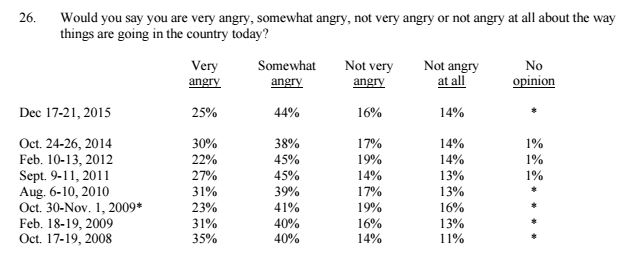It seems that voters have been disenchanted ever since they had the opportunity to elect Barack Obama president. In 2008, the country was war-weary, terrified of its financial state, and eager to change its polarizing politics. In 2010, it was worried about its solvency, agitated by a law of unprecedented scope, and skeptical of the concentration of power in Washington. In 2012, it was weary of the partisan wars, and yet billions of dollars were spent to send the same combatants back to work. By 2014, little was different. Republicans were then awarded full control of Congress. It’s now 2016, and the GOP base doesn’t seem terribly impressed with the results.
How fitting that now, on the first day of another election process, storm clouds are gathering in Iowa. It was just eight years ago that voting was supposed to be such a sunny occasion.
There are more reasons why Donald Trump and Bernie Sanders are serious candidates for president than just the electorate’s consistent displeasure with the country’s state of affairs. But consider how there’s been conventional turnover in the nation’s capital—both the House and the Senate have flipped majorities since 2010—and observe how levels of “voter anger” have remained steady:

Since 2008, the CNN-ORC poll has recorded eight measures of this statistic. Combining “somewhat angry” and “very angry” into a category of “generally angry”, at least 64 percent of the sample has been miffed about the nation’s direction each time. In December 2015, that figure was 69 percent. It’s been as high as 75 percent.
Pew lists “angry” and “frustrated” as separate responses to a similar question. The combined number? 79 percent, as of November.
At the same time, the public’s eroding confidence in the federal government to “do what is right” has plummeted. As of 2015, that measure is a measly 19 percent, according to Pew.
Taking into account voter anger and distrust in government institutions, it’s hardly a surprise that the 2016 campaign would accommodate candidates who are populist outsiders. As the pollsters behind a survey of New Hampshire voters wrote this morning, “[O]ne uniting metric where candidates do considerably better than their rivals are among those voters who express distrust in the federal government.”
Among such voters, Trump and Sanders dominate their respective Granite State primaries by more than 40 percentage points.
“The fuel of these outsider candidacies could very well be that trust in the federal government, which has been bending for decades, has finally broken,” the release from the University of Massachusetts Lowell continues.
Perhaps Iowa and New Hampshire will be remembered as more than just primary states this year. History could record them as breaking points in presidential politics.
